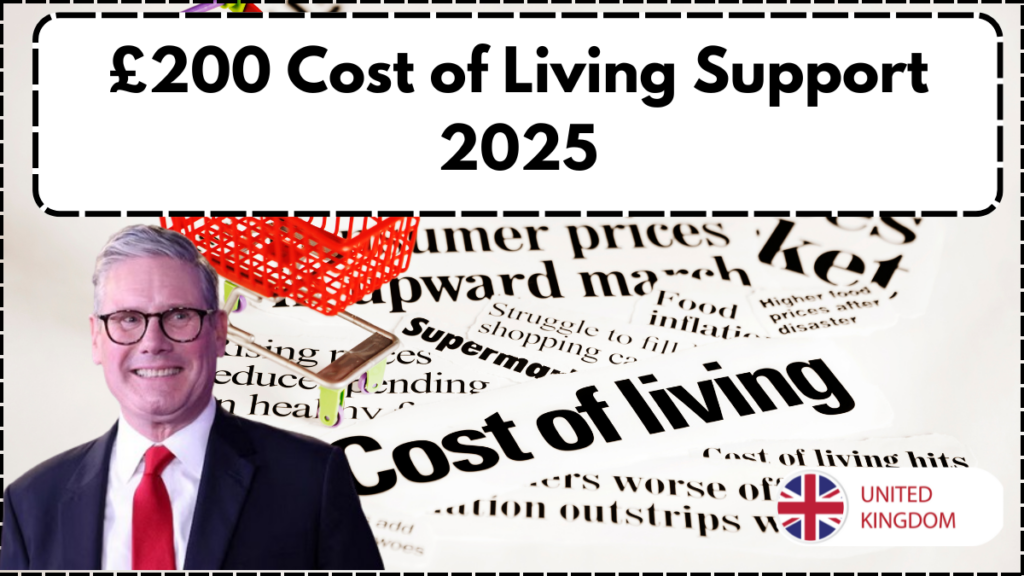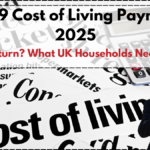As household budgets continue to strain under the weight of rising living costs and elevated energy prices in April 2025, the UK government has stepped in to support vulnerable residents with a targeted initiative: the £200 Cost of Living Support payment. Delivered through local authorities as part of the Household Support Fund (HSF), this one-time payment offers vital relief for low-income households and individuals facing financial distress.

What Is the £200 Cost of Living Support?
The £200 Cost of Living Support payment is a non-repayable, tax-free financial grant designed to ease the burden of inflation on essentials such as food, utilities, and rent. The initiative operates under the Household Support Fund and is administered locally by councils across England, Scotland, Wales, and Northern Ireland.
Unlike some benefits, this grant is available to a broader range of applicants—not just those on welfare. It can also assist households experiencing temporary hardship due to unforeseen circumstances like sudden unemployment or increased energy costs.
Overview Table: £200 Cost of Living Payment 2025
| Detail | Information |
|---|---|
| Amount | £200 one-time payment |
| Purpose | To help cover costs like food, energy bills, and housing |
| Eligibility | Varies by council; typically for low-income or financially vulnerable |
| Application Deadline | 31 March 2025 or earlier if funding is depleted |
| Payment Methods | Bank transfer, vouchers, or cash (depends on local council) |
| Source | Household Support Fund via GOV.UK |
Why This Support Is Crucial in April 2025
The UK economy remains under inflationary pressure in 2025, with high utility costs and food prices impacting millions. Energy tariffs, despite the government’s energy price cap, are still difficult for many to manage. The £200 payment acts as a financial buffer to help families avoid falling into deeper debt or being forced to choose between heating and eating.
This localised delivery model ensures the payment is more tailored and efficiently distributed, with councils prioritising the most urgent cases within their communities.
Who Qualifies for the £200 Cost of Living Support in 2025?
Eligibility depends on your local council’s criteria, but it generally includes the following categories:
1. Households with Low Income
You may qualify if your household income falls below a specific threshold, such as:
- Less than £40,000 annual income for couples or families
- Less than £30,000 for single individuals
- Savings below £2,000
2. Recipients of Means-Tested Benefits
Automatic eligibility is often extended to those receiving government benefits like:
- Universal Credit
- Pension Credit
- Income Support
- Employment and Support Allowance (ESA)
3. Temporary Financial Hardship Applicants
If you’re not currently on benefits, you might still qualify by demonstrating short-term financial strain due to:
- Job loss or reduced work hours
- Illness or disability
- Increased household bills
- Emergency expenses (e.g., appliance repair, childcare, relocation)
How to Apply for the £200 Cost of Living Grant
Step-by-Step Process:
- Find Your Local Authority Use the GOV.UK council finder to locate your local authority’s website.
- Locate the Household Support Fund Page Search for sections labelled “Cost of Living Payment” or “Household Support Fund.”
- Check Eligibility Criteria Review the latest guidance published by your council.
- Prepare Required Documents Commonly needed documents include:
- Proof of ID (e.g., passport, driver’s license)
- Bank statements (usually last 1-3 months)
- Benefits award letters or payslips
- Any relevant hardship evidence (e.g., medical notes, redundancy letters)
- Submit Your Application Applications can be submitted online or, in some areas, in-person or by post.
- Await Notification After submission, councils typically notify applicants by email or post regarding the outcome.
Payment Methods and Processing
Depending on local policies, the £200 payment may be distributed in the following ways:
- Bank Transfer: Preferred for speed and convenience
- Vouchers: Issued for groceries, energy top-ups, or essential goods
- Cash Collection: Available at selected council offices or post offices
To avoid delays, ensure your bank details and personal information are up to date before applying.
Impact on Existing Benefits and Taxes
There is no impact on your regular benefits or tax status. The payment does not:
- Affect Universal Credit or other DWP payments
- Count as taxable income
- Require repayment under any circumstances
Deadline for Applications and Expected Payment Date
- Application Deadline: 31 March 2025 or earlier if funds are exhausted.
- Payment Schedule: Most councils aim to distribute payments by February 2025. Timelines may vary based on processing volume and individual council policies.
Tips to Ensure Your Application Is Approved
- Apply early: Funding is limited and high in demand.
- Review eligibility rules carefully.
- Submit clear, legible documents.
- Reach out to council support teams if unsure about any part of the process.
Conclusion
The £200 Cost of Living Support payment in 2025 provides essential relief for UK residents facing increased financial stress due to inflation and soaring living expenses. Whether you’re on benefits or facing temporary hardship, this government-backed support can offer a lifeline. Be sure to apply early, follow the proper steps, and take full advantage of the resources available to you.
FAQs About £200 Cost of Living Support 2025
Who is eligible for the £200 payment?
Eligibility varies by council, but generally includes low-income households, those on benefits, or individuals facing temporary hardship.
Does receiving the £200 affect my benefits?
No. It is a non-taxable, one-off payment and does not impact your existing benefits.
Can I apply if I am not on benefits?
Yes. If you can prove financial hardship (e.g., job loss, illness), you may still qualify.
What happens if my council runs out of funding?
Funds are limited, so councils may close applications early. Apply as soon as possible.
How will I receive the payment?
Most councils issue payments through direct bank transfers, but some may provide vouchers or cash.
For More Information Click Here
Pari is a passionate writer known for captivating stories that blend imagination and reality. Inspired by travel, history, and everyday moments, Pari crafts narratives that resonate deeply with readers.




